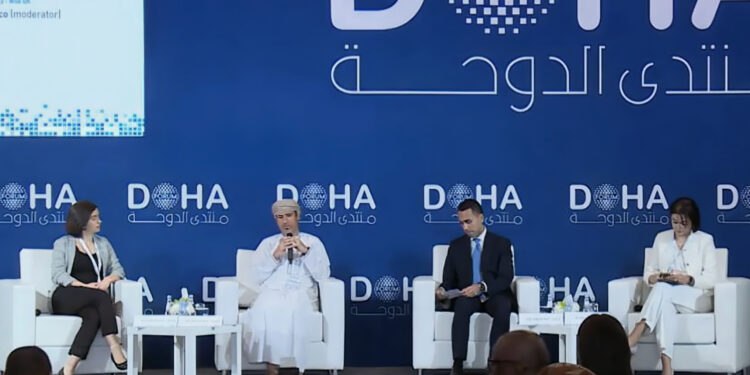Doha – The world is struggling to agree on energy transition pathways that would limit global warming to 1.5°C.
But it is clear that the new energy relations between Europe and the Gulf – which took shape in the wake of the war in Ukraine – have now opened new ways to reconcile energy interests and confront climate change.
Experts and officials who participated in the “Energy Transition” session at the Doha Forum 2023 confirmed that the European Union countries turned to the Gulf states, after the Russian war on Ukraine, in order to ensure their supply of oil, and forged strategic relations with the aim of cooperation in the field of renewable energy.
Omani Minister of Energy and Minerals, Salem bin Nasser Al-Aufi, said that his country announced at the end of last year its intention to become a primary station for green hydrogen for local and international consumption.
He pointed out that the target is to produce about 1.25 million tons of green hydrogen by 2030, in addition to an agreement to export liquid hydrogen, which includes “conducting a detailed assessment of the requirements for developing a facility to condense, store and export hydrogen in the Sultanate of Oman, in addition to providing specialized ships to transport liquid hydrogen, which are currently being developed.” By Jaslog.
For his part, the World Bank’s energy economist, Dr. Moaz Al-Sharif, said that relations between the Gulf Cooperation Council countries and the European Union are in a very good position, pointing out the presence of new elements in this partnership, the most important of which are energy security and political dialogue.
He explained – in an interview with Al Jazeera Net – that the data indicate that the Gulf and European sides agreed on a set of important principles that must be included in the strategic partnership document, pointing out the importance of taking the general atmosphere in the Gulf and the European Union into account, and not ignoring important regional developments, including the war on… Gaza.
Moaz Al-Sharif added that the European Union is currently working with the Gulf on initiatives on soft energy and fruitful solutions to conflicts.
Al-Sharif expected that the fields of agriculture and solar energy would become among the areas of future cooperation between the European Union and the Gulf.
He said, “Both the GCC countries and the European Union depend on the performance of global markets, and there is a need for more cooperation and dialogue on how to work together in the G20.”

Reliable partner
In turn, the former Italian Foreign Minister and European Union envoy to the Gulf, Luigi Di Maio, said that the Union began – before the Russian-Ukrainian war on February 24, 2022 – highlighting the Gulf states as a reliable partner in the field of energy supplies.
He added that the European Union is now investing in diversifying the economy and renewable energy, pointing out that there are many projects being developed, in addition to strengthening cooperation agreements in green energy.
Di Maio explained that the Union will import about 10 million tons of hydrogen in 2030, considering that the most important challenge relates to unified standards to define the concept of green hydrogen and blue hydrogen, in addition to the infrastructure necessary for such projects.
He pointed out that the role of the Gulf countries is important in the “Green Corridor” initiative recently launched by the G20, and this corridor is being implemented through hydrogen and renewable energy.
In turn, the CEO of the Women in Smart Energy Organization in the United Kingdom, Elif Kalik, outlined the challenges facing enhancing green cooperation between Europe and the Gulf in infrastructure, technology and education.



